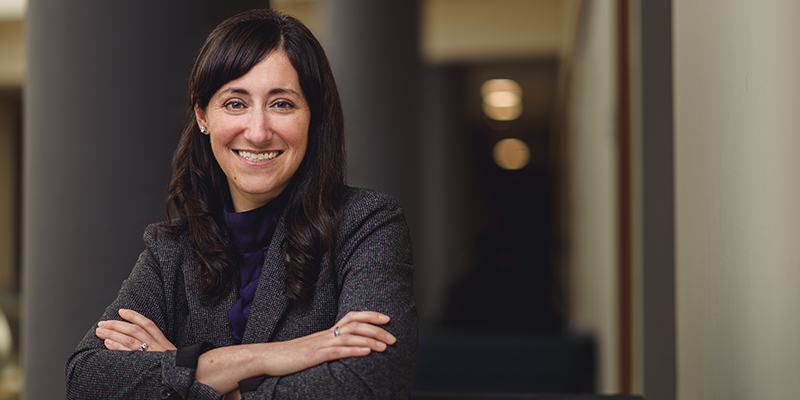Purdue management professor studies stress management, interpersonal relationships and work-life balance
WEST LAFAYETTE, Ind. — This spring marks four years since the COVID-19 pandemic created unprecedented shifts in the everyday work lives of millions of Americans. With those seismic changes, new attitudes and practices have emerged, challenging long-held beliefs of how people should think about their time on, and off, the clock.
For Allison Gabriel, who has spent years studying emotions, recovery, motivation, stressors, interpersonal relationships and a bevy of other experiences in the workplace, that conversation is overdue.
“I felt like we were screaming into the abyss for a long time about why we should care about how people feel at work and why well-being is so important,” said Gabriel, the Thomas J. Howatt Chair in Management in the organizational behavior and human resources area of the Mitchell E. Daniels, Jr. School of Business at Purdue University and faculty director of Purdue’s new Center for Working Well. “Now organizations want to, and leaders understand they have to, talk about well-being if they want to stay competitive.”
Additional Information
Gabriel’s area of expertise is especially relevant in today’s workplace climate, where employees who feel empowered at their jobs are far more engaged in their work. Her research focuses on work-related stress, interactions with co-workers, how employees detach from work and how those same workers — especially new mothers — transition back to their professional roles after major changes in their personal lives.
Many returning mothers experience postpartum depression, which was the focus of a paper Gabriel recently co-authored in the Journal of Applied Psychology. Gabriel and researchers from several other universities found that support from employers in the form of paid maternity leave, as well as mental health policies and flexible work schedules aimed at benefiting pregnant women and new mothers, were critical. The study also showed that organizations that prioritized mothers’ issues helped attract and retain women in their workforce.
“I think there’s this assumption that you have a baby, you go on maternity leave — for however many weeks you’re fortunate enough to get — and then you come back and you’re the same person,” Gabriel said, “But you’re not the same. Mothers are so fundamentally changed in every capacity, so we need to help organizations understand and build more support and infrastructure around this issue because it affects everybody.”
In addition to workers, Gabriel has also studied leaders and how they handle themselves on the job. Leaders are in control of workplace culture and supporting their own well-being and the well-being of those that they lead, which Gabriel argues is an essential responsibility. When leaders don’t detach, the stress from their own job can trickle down to their employees. Constantly thinking about work hurt more than it helped performance as a leader, according to the results of another study co-authored by Gabriel and published in the Journal of Applied Psychology.
“I call leaders ‘recovery beacons’ because the signals they send about what they value when it comes to their own well-being signals to the people they lead about what they themselves can value,” Gabriel said.
Uncovering these findings can be a laborious process. Largely using experience sampling methods to capture glimpses into employees’ daily life and more recently qualitative interviews, the findings often capture the complex, challenging ways that employees experience life at work and home. Gabriel admits that the data can be “messy,” and the results can often be challenging to wade through, but a passion for enacting positive change drives her to find solutions.
“I want to start these conversations so people feel more empowered to tell co-workers, supervisors or leaders what’s happening in their lives,” Gabriel said. “People are messy, and I find that really beautiful and exciting.”
She added, “What I get to think about every day is, how do we help them make sense of the messiness in a way that makes them feel better at work and at home to lead happier lives?”
About Purdue University
Purdue University is a public research institution demonstrating excellence at scale. Ranked among top 10 public universities and with two colleges in the top four in the United States, Purdue discovers and disseminates knowledge with a quality and at a scale second to none. More than 105,000 students study at Purdue across modalities and locations, including nearly 50,000 in person on the West Lafayette campus. Committed to affordability and accessibility, Purdue’s main campus has frozen tuition 13 years in a row. See how Purdue never stops in the persistent pursuit of the next giant leap — including its first comprehensive urban campus in Indianapolis, the new Mitchell E. Daniels, Jr. School of Business, and Purdue Computes — at
Writer/Media contact: Derek Schultz, dcschultz@purdue.edu
Source: Allison Gabriel



:max_bytes(150000):strip_icc()/Update-Pull-and-Push-Day-Workout-d3bbeb169bae427a99dd5162993f6641.jpg?w=360&resize=360,270&ssl=1)